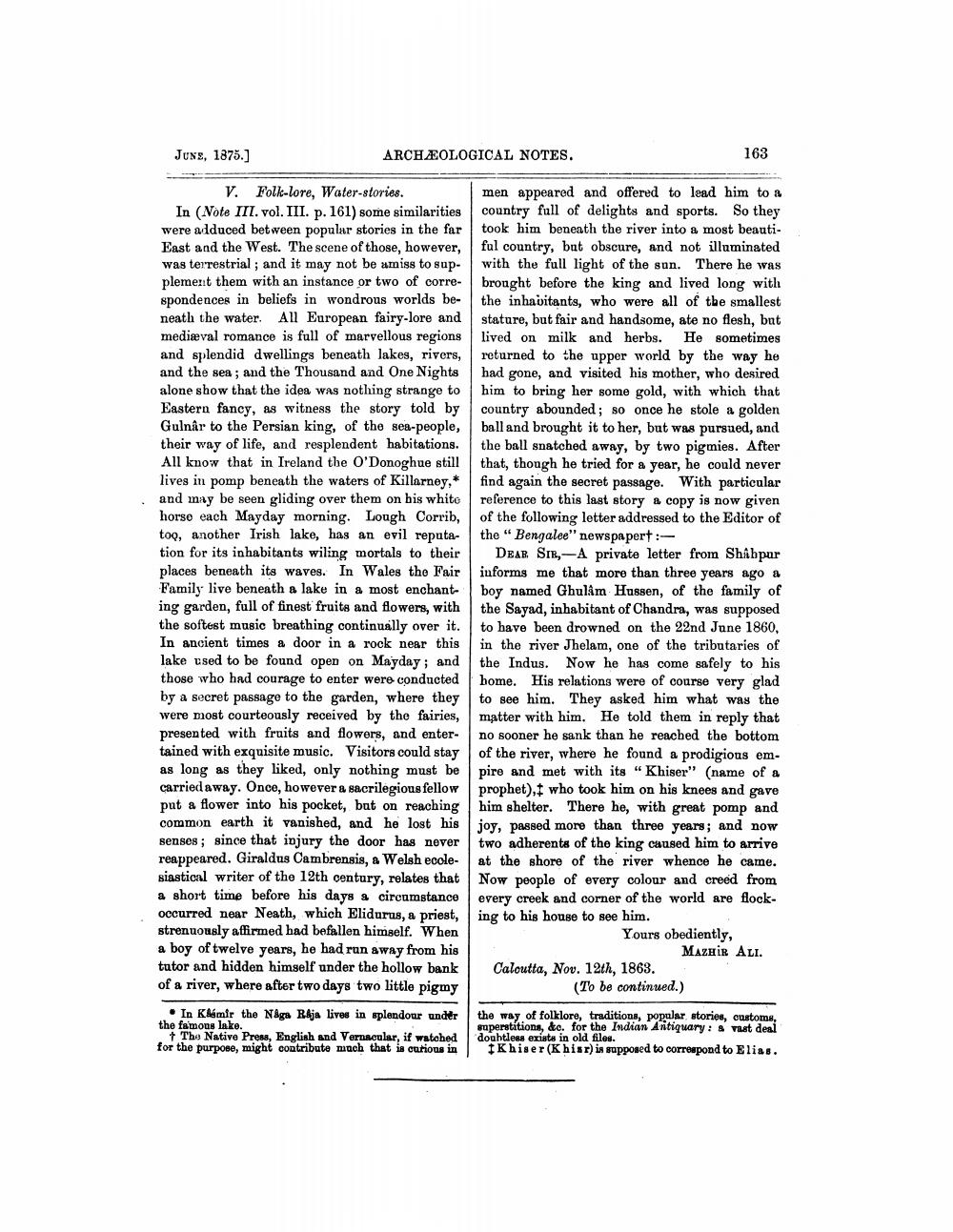________________
JUNE, 1875.]
V.
Folk-lore, Water-stories.
In (Note III. vol. III. p. 161) some similarities were adduced between popular stories in the far East and the West. The scene of those, however, was terrestrial; and it may not be amiss to supplement them with an instance or two of correspondences in beliefs in wondrous worlds beneath the water. All European fairy-lore and mediæval romance is full of marvellous regions and splendid dwellings beneath lakes, rivers, and the sea; and the Thousand and One Nights alone show that the idea was nothing strange to Eastern fancy, as witness the story told by Gulnar to the Persian king, of the sea-people, their way of life, and resplendent habitations. All know that in Ireland the O'Donoghue still lives in pomp beneath the waters of Killarney,* and may be seen gliding over them on his white horse each Mayday morning. Lough Corrib, too, another Irish lake, has an evil reputa tion for its inhabitants wiling mortals to their places beneath its waves. In Wales the Fair Family live beneath a lake in a most enchanting garden, full of finest fruits and flowers, with the softest music breathing continually over it. In ancient times a door in a rock near this lake used to be found open on Mayday; and those who had courage to enter were conducted by a secret passage to the garden, where they were most courteously received by the fairies, presented with fruits and flowers, and entertained with exquisite music. Visitors could stay as long as they liked, only nothing must be carried away. Once, however a sacrilegious fellow put a flower into his pocket, but on reaching common earth it vanished, and he lost his senses; since that injury the door has never reappeared. Giraldus Cambrensis, a Welsh ecolesiastical writer of the 12th century, relates that a short time before his days a circumstance occurred near Neath, which Elidurus, a priest, strenuously affirmed had befallen himself. When a boy of twelve years, he had run away from his tutor and hidden himself under the hollow bank of a river, where after two days two little pigmy
ARCHEOLOGICAL NOTES.
In Kémir the Naga Raja lives in splendour under the famous lake.
The Native Press, English and Vernacular, if watched for the purpose, might contribute much that is curious in
163
men appeared and offered to lead him to a country full of delights and sports. So they took him beneath the river into a most beautiful country, but obscure, and not illuminated with the full light of the sun. There he was brought before the king and lived long with the inhabitants, who were all of the smallest stature, but fair and handsome, ate no flesh, but lived on milk and herbs. He sometimes returned to the upper world by the way he had gone, and visited his mother, who desired him to bring her some gold, with which that country abounded; so once he stole a golden ball and brought it to her, but was pursued, and the ball snatched away, by two pigmies. After that, though he tried for a year, he could never find again the secret passage. With particular reference to this last story a copy is now given of the following letter addressed to the Editor of the "Bengalee" newspapert:
DEAR SIR,-A private letter from Shahpur informs me that more than three years ago a boy named Ghulam Hussen, of the family of the Sayad, inhabitant of Chandra, was supposed to have been drowned on the 22nd June 1860, in the river Jhelam, one of the tributaries of the Indus. Now he has come safely to his home. His relations were of course very glad to see him. They asked him what was the matter with him. He told them in reply that no sooner he sank than he reached the bottom of the river, where he found a prodigious empire and met with its "Khiser" (name of a prophet), who took him on his knees and gave him shelter. There he, with great pomp and joy, passed more than three years; and now two adherents of the king caused him to arrive at the shore of the river whence he came. Now people of every colour and creed from every creek and corner of the world are flocking to his house to see him.
Yours obediently, MAZHIR ALI.
Calcutta, Nov. 12th, 1863. (To be continued.)
the way of folklore, traditions, popular stories, customs, superstitions, &c. for the Indian Antiquary: a vast deal
doubtless exists in old files.
Khiser (Khisr) is supposed to correspond to Elias.




